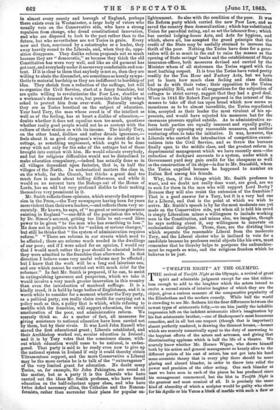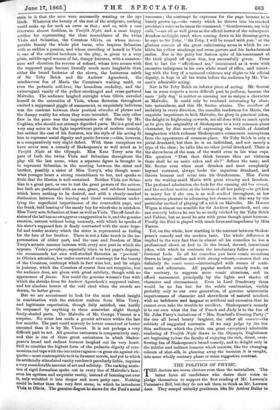"TWELFTH NIGHT " AT THE OLYMPIC.
THE revival of Twelfth Night at the Olympic, a revival of great spirit and admirable judgment except for one blot ridicu- lous enough to add to the laughter which the actors intend to excite a second strain of interior laughter of which they are the object, gives a curious measure of the comparative popularity of the Elizabethan and the modern comedy. While half the world is crowding to see Mr. Sothern hit the finer differences b6tween the newest types of aristocratic folly,—to see him justify the indelible impression left on the indolent aristocratic idiot's imagination by his fast aristocratic brother,—one of Shakespeare's most humorous comedies, and in all but one respect (though that is important) almost perfectly rendered, is drawing the thinnest houses, —houses which are scarcely numerically equal to the duty of answering to the happiest efforts of the actors and actresses, and giving that discriminating applause which is half the life of a theatre. We scarcely know whether Mr. Horace Wigan, who shows himself both by his action and general management so keenly alive to the different points of his cast of actors, has not got into his head some eccentric theory that in every play there should be some glaring and absurd blunder, in order to throw into relief the power and precision of the other acting. One such blunder at least we have seen in each of the pieces he has produced since his management commenced, but the blot in Twelfth Night is the greatest and most comical of all. It is precisely the same kind of absurdity of which a sculptor would be guilty who chose for his Apollo or his Venus a block of marble with such a flaw or
stain in it that the nose were necessarily wanting or the eye black. Whatever the beauty of the rest of the sculpture, nothing could make up for such an error as that ; and so, with a cast otherwise almost faultless, in Twelfth Night, and a most happy artifice for representing the close resemblance of the twins Viola and Sebastian, the Countess Olivia, on whose incom- parable beauty the whole plot turns, who inspires Sebastian with so sudden a passion, and whose unveiling of herself to Viola is one of the critical incidents in the play, is given to a very plain, middle-aged woman of fat, dumpy features, with a counten- ance and elocution the reverse of refined, whose love scenes with the supposed page become literally much more laughable than either the broad fooleries of the clown, the boisterous mirth of Sir Toby Belch and Sir Andrew Aguecheek, the mischievous fun of Maria the Countess's waiting maid, or even the pedantic self-love, the boundless credulity, and the extravagant vanity of the yellow-stockinged and cross-gartered Malvolio. The audience laughed outright when Olivia unveiled herself to the entreaties of Viola, whose flatteries throughout excited a suppressed giggle of amusement, so exquisitely ludicrous was the contrast between their poetical abandon of phrase and the dumpy reality for whom they were intended. The only other flaw in the piece was the impersonation of the Duke by Mr. Coghlan, who should not attempt dignified parts. He is a good and very easy actor in the light impertinent parts of modern comedy, but neither the cast of his features, nor the style of his acting fit him to represent social dignity and poetic fervour ;—this, however, is a comparatively very slight defect. With these exceptions we have never seen a comedy of Shakespeare's so well acted as is Twelfth Night at the Olympic. Miss Kate Terry acts the part of both the twins Viola and Sebastian throughout the play till the last scene, when a separate figure is brought in to represent Sebastian in the meeting between the sister and brother, possibly a sister of Miss Terry's, who though some- what younger bears a strong resemblance to her, and speaks so little that the illusion is well sustained. Neither Viola nor Sebas- tian is a great part, or one to test the great powers of the actress, but both are performed with an ease, grace, and subdued humour which leave nothing to be desired, and with a clearly-marked distinction between the leaning and timid womanliness under- lying the superficial impertinence of the counterfeit page, and the frank, bold bearing of the manly boy for whods-she is mistaken. Miss Terry acts Sebastian at least as well as Viola. The off-hand de- cisionof the lad has no swagger or exaggeration in it, and the genuine emotion, earnest without being unmanly, with which he speaks of his sisters supposed fate is finely contrasted with the more hope- ful and tender anxiety which the sister is represented as feeling for the fate of her brother. There is not a false touch in the im- personation of either part, and the ease and freedom of Miss Terry's artistic manner increase with every new part in which she appears. Viola's persiflage, especially when, in her page's disguise, she recommends her own well-studied flatteries as " poetical " to Olivia's attention, her under-current of contempt for the beauty of the Countess, contempt which in fact wins her, and its origin in jealousy, which the Countess of course does not recognize, but the audience does, are given with great subtlety, though with no appearance of fineise. Nor could the genuine woman's fear with which she shrinks from Sir Andrew Aguecheek's supposed valour, and her absolute horror of the cold steel when the swords are drawn, be better given.
But we are accustomed to look for the most refined insight in combination with the strictest realism from Miss Terry, and legitimate expectation, though fully satisfied, can hardly be surpassed by anything in these somewhat slight though finely-shaded parte. The Malvolio of Mr. George Vincent is a surprise. No actor has made a greater advance within the last few months. The part could scarcely be better conceived or better executed than it is by Mr. Vincent. It is not perhaps a very difficult part to act. All genuine caricature is comparatively easy, and this is one of those great caricatures in which Shakes- peare's broad and radiant humour laughed out its very heart. Still to combine the highest form of the pedantic dignity of cere- monious red tape with the one extravagance—a gross sin against eti- quette—most contemptible to it in its saner moods, and yet to which its artificially stimulated vanity renders it peculiarly liable, requires a very considerable amount of art and subtlety. The carking anxie- ties of rigid formalism spoke out in every line of Malvolio's face ; even his egotism and exquisite vanity, instead of beaming out over it, only wrinkled it into deeper and more petty care. Nothing could be better than the very first scene, in which he introduces Viola to Olivia. The genuine disgust he shows for the Fool's social
successes ; the contempt he expresses for the page because ho is barely grown up,—the vanity which he throws into his cracked precisian's voice as he issues the command, " Gentlewoman, my lady calls,"—are all as well given as the official horror of the subsequent drunken midnight revel, when coming down in his dressing-gown he says to Sir Toby, " Sir Toby, I will be round with you," or the glorious conceit of the great culminating scene in which he ex- hibits his yellow stockings and cross garters and his lackadaisical smiles. Nor is the petty but furious spite of his resentment at. the trick played off upon him, less successfully given. From first to last the " affectioned ass," intoxicated as it were with excessive indulgence in his own white wand of office, and resent- ing with the fury of a menaced existence any slight to his official dignity, is kept in all his traits before the audience by Mr. Vin- cent's admirable acting.
Nor is Sir Toby Belch an inferior piece of acting. Mr. Soutar has in some respects a more difficult part to perform, because the mere ' jolly dog' is neither so amusing nor so unique a character as Malvolio. It could only be rendered interesting by abso- lute naturalness, and this Mr. Soutar attains. The overflow of inebriety in every direction, the maudlin tenderness for Maria, the- exquisite impatience to kick Malvolio, the glory in practical jokes,. the delight in frightening cowards, are all done with so much spirit as to give the originality of Shakespeare to a very common-place character, by dint merely of expressing the wealth of detailed imagination which redeems Shakespeare's commonest conceptions from the appearance of common-place. Sir Toby Belch is only a jovial drunkard, but then he is an individual, and not merely a type of the class ; he talks like no other jovial drunkard. There is the shrewdness of the man of the world even in his wine cups. His question "Dolt thou think because thou art virtuous there shall be no more cakes and ale ?" defines the man; and Mr. Soutar even when most drunken and most completely beyond restraint, always looks the sagacious drunkard, and throws humour and sense into his drunkenness. Miss Foote- acts the waiting-maid Maria with great vivacity and freedom.. The profound admiration she feels for the cunning old bon vivanty and the evident motive at the bottom of all her policy—to get him to marry her if she can, is as well studied throughout, as her mischievous pleasure in advancing her chances in this way by the particular method of playing off a trick on Malvolio. Mr. Horace Wigan is almost too sensible for Sir Andrew Aguecheek, and one can scarcely believe he can be so easily tricked by Sir Toby Belch and Fabian, but as usual he acts with great though quiet humour. Finally the Fool is played with much force and impudence by Miss Farren.
Yet, on the whole, how startling is the contrast between Shakes- peare's comedy and the modern taste. The whole difference is implied in the very fact that in almost all his comedies he has a professional clown or fool to do the broad, shrewd, intentional jokes, with which he contrasts the involuntary follies of unpro- fessional fools. In all his comedies you have comic situations drawn in large outline• and with strong colours,—scenes that are definitely the comic scenes—intermingled with scenes of senti- ment and adventure. All popular modern comedy tends, on the contrary, to suppress mere comic situations, and to afford amusement principally by the lights and shades of character and circumstance. Even in Lord Dundreary there would be no fun but for the subtle combination, visible probably only to our own generation, of genuine aristocratic imperiousness, of character and shrewdness of natural intellect with an indolence and languor so artificial and excessive that he cannot even take the trouble to recollect. Shakespeare's comedy is to our own what the fun of Punch and Judy is to the fun of
Mr. John Parry's imitations of "Mrs. Roselears Evening Party ;" the one all broad hearty laughter, the other all nuance—the subtlety of suggested contrasts. If we may judge by the too thin audiences which the (with one great exception) admirable rendering of Twelfth Night draws to the Olympic, Englishmen
are beginning to lose the faculty of enjoying the rich, direct, over- flowing fun of Shakespeare's broad comedy, and to delight only in the subtler and indirect humour which consists, like the changing colours of shot-silk, in glancing away the moment it is caught, into some wholly contrary phase or some suggestive contrast.































 Previous page
Previous page